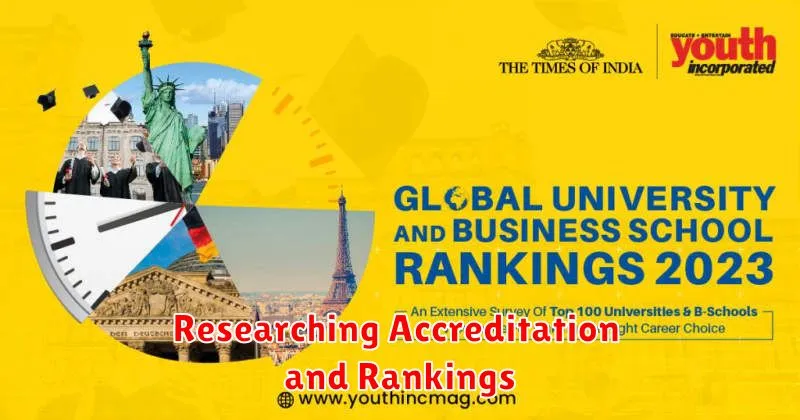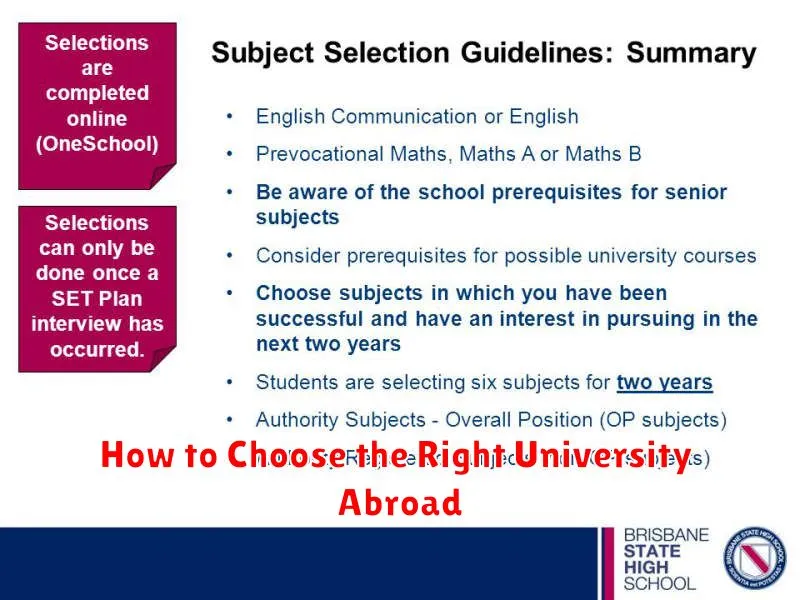Choosing the right university abroad is a pivotal decision that can significantly impact your academic and personal future. Navigating the complex landscape of international education can be daunting, with a myriad of factors to consider, from program specifics and university rankings to cultural immersion opportunities and financial aid options. This comprehensive guide will equip you with the necessary tools and knowledge to make an informed choice, helping you select the best university abroad that aligns perfectly with your academic aspirations, career goals, and personal preferences. Whether you are seeking undergraduate programs abroad, graduate studies abroad, or specialized study abroad programs, this article will provide valuable insights to facilitate your decision-making process.
From understanding the nuances of university applications abroad to deciphering international student visa requirements, this guide will address crucial aspects of studying abroad. We will delve into the importance of researching universities worldwide, evaluating university admission requirements, and exploring the various study abroad destinations available. By carefully considering factors like university tuition fees, scholarship opportunities for international students, and the overall cost of studying abroad, you can make a well-informed decision that sets you on the path to a successful and enriching international education experience. Begin your journey towards finding the perfect university abroad with this essential guide.
Understanding Your Academic Goals
Choosing the right university abroad starts with a thorough understanding of your academic goals. Ask yourself key questions about what you want to achieve academically. What subject are you passionate about? What level of education are you aiming for (Bachelor’s, Master’s, PhD)?
Identifying your specific academic interests within your chosen field is crucial. Do you prefer theoretical research or practical applications? Considering these factors will help you narrow down your university choices and focus on institutions that align with your aspirations. Clearly defined goals are essential for a successful academic journey abroad.
Researching Accreditation and Rankings

Accreditation plays a vital role in verifying the quality and legitimacy of a university’s programs. Ensure the universities you are considering are accredited by recognized agencies. This is particularly important for professional programs like medicine, engineering, and law. Check the specific accreditation requirements of your intended field of study.
University rankings can offer a general overview of institutional reputation and academic performance. However, consider these rankings with caution. Different ranking systems use varying methodologies and prioritize different factors. Focus on rankings that align with your priorities, such as research output, faculty expertise, or international student support.
Rather than relying solely on overall rankings, explore subject-specific rankings which often provide a more accurate reflection of a university’s strengths in your chosen field. Research the ranking criteria to understand how the rankings are determined.
Evaluating Campus Facilities
Campus facilities play a crucial role in your overall university experience. A well-equipped campus can significantly enhance your learning and social life. When evaluating potential universities, consider the following key areas:
Academic Facilities
Assess the quality of libraries, laboratories, and classroom technology. Modern resources and equipment can greatly benefit your studies. Consider the availability of computer labs, specialized software, and research facilities relevant to your chosen field.
Student Life Facilities
Investigate the availability and quality of student accommodation, dining halls, and recreational facilities. Comfortable living spaces, nutritious food options, and opportunities for exercise and relaxation are essential for a positive student experience. Look into sports facilities, student unions, and spaces for clubs and organizations.
Support Services
Consider the accessibility of support services such as health centers, counseling services, and career centers. These resources can contribute to your well-being and future success.
Considering Tuition and Scholarships

Tuition fees are a significant factor when choosing a university abroad. Research the cost of tuition for your chosen program at different universities. Consider the length of the program as this will impact the overall cost.
Living expenses also contribute significantly to the overall cost. Research the cost of living in the city or region where the university is located. Factor in accommodation, food, transportation, and other daily expenses.
Explore scholarship opportunities. Many universities and external organizations offer scholarships to international students. Research these options thoroughly and apply to any scholarships for which you are eligible. Scholarships can significantly reduce the financial burden of studying abroad.
Create a realistic budget that includes tuition, living expenses, and other associated costs. This will help you determine the affordability of different universities and programs. Be sure to factor in potential currency fluctuations.
Location and Lifestyle Factors
Choosing a university abroad involves more than just academics. Location plays a crucial role in your overall experience. Consider whether you prefer a bustling urban environment with easy access to cultural attractions and entertainment or a quieter, more rural setting focused on academic pursuits.
Cost of living varies drastically between locations. Research the average expenses for accommodation, food, transportation, and leisure activities in your prospective city. Factor this into your budget planning.
The local culture and language will impact your daily life. While studying in an English-speaking country might seem easier, immersing yourself in a new language and culture can be incredibly enriching. Reflect on your comfort level and willingness to adapt.
Climate is another important factor. If you thrive in warm weather, you might not enjoy a university in a region with harsh winters. Consider your preferences and how the climate might affect your studies and overall well-being.
Think about the distance from home. Being far from family and friends can be challenging for some, while others relish the independence. Consider how often you intend to travel home and the associated costs.
Talking to Alumni and Students
Connecting with both alumni and current students offers invaluable insights into the realities of university life. Alumni can provide a longer-term perspective on the value of their education, career paths after graduation, and the overall impact of their university experience. They can offer advice on navigating the academic landscape and the challenges they faced.
Current students, on the other hand, can provide a real-time view of daily life on campus. They can share their experiences with classes, professors, extracurricular activities, and the social environment. Talking to them can give you a sense of the current student body and whether you would feel comfortable and thrive in that setting.
Consider asking about:
- Academic rigor and teaching quality
- Support services available to students
- Campus culture and social life
- Career services and internship opportunities
- Accommodation options and cost of living
By gathering perspectives from both past and present students, you can develop a more comprehensive and nuanced understanding of the university, enabling you to make a more informed decision.
Checking Post-Graduate Opportunities

Investigating post-graduate opportunities is a crucial aspect of selecting the right university abroad. Future career prospects should heavily influence your university choice. Consider whether the institution offers doctoral programs or has established pathways to professional schools.
Research the university’s alumni network. A strong network can significantly benefit your career trajectory by opening doors to internships, mentorship, and job opportunities. Look into alumni success stories and their current fields of work.
Location also plays a vital role in post-graduate opportunities. Investigate the local job market in your chosen field. Are there major companies or research institutions nearby that align with your career goals? Consider whether the region offers opportunities for further professional development or specialization.

